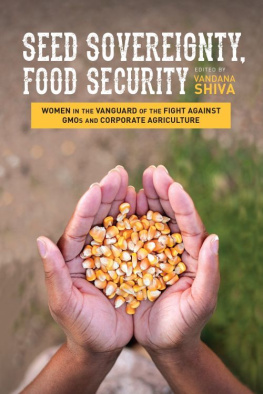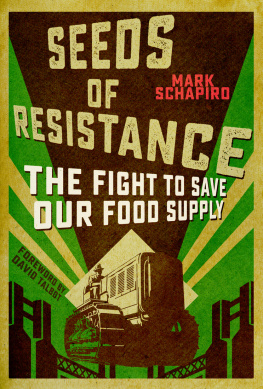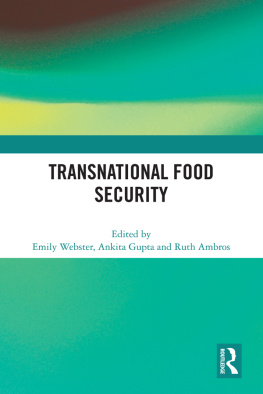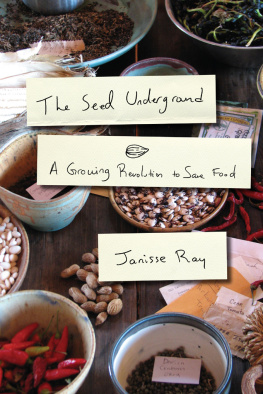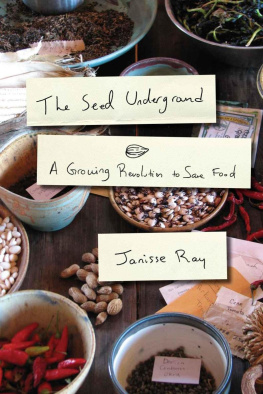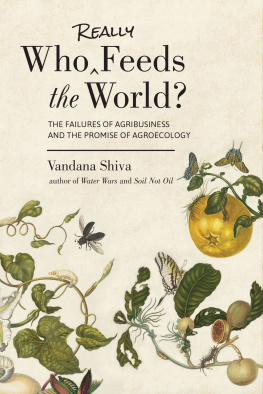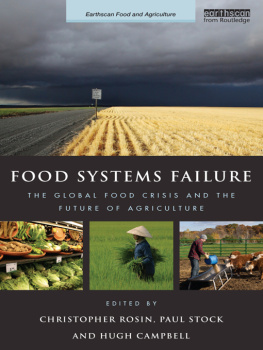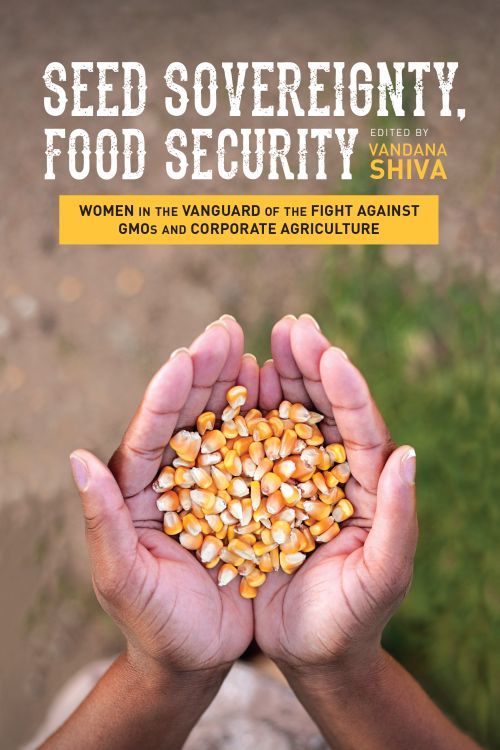Seed Sovereignty, Food Security
WOMEN IN THE VANGUARD OF THE FIGHT AGAINST GMO S AND CORPORATE AGRICULTURE
Edited by
Vandana Shiva

North Atlantic Books
Berkeley, California
Copyright 2016 by Vandana Shiva. All rights reserved. No portion of this book, except for brief review, may be reproduced, stored in a retrieval system, or transmitted in any form or by any meanselectronic, mechanical, photocopying, recording, or otherwisewithout the written permission of the publisher. For information contact North Atlantic Books.
Published by
North Atlantic Books
Berkeley, California
Cover photo iStockphoto.com/AfricaImages
Cover design by Jasmine Hromjak
Seed Sovereignty, Food Security: Women in the Vanguard of the Fight against GMOs and Corporate Agriculture is sponsored and published by the Society for the Study of Native Arts and Sciences (dba North Atlantic Books), an educational nonprofit based in Berkeley, California, that collaborates with partners to develop cross-cultural perspectives, nurture holistic views of art, science, the humanities, and healing, and seed personal and global transformation by publishing work on the relationship of body, spirit, and nature.
North Atlantic Books publications are available through most bookstores. For further information, visit our website at www.northatlanticbooks.com or call 800-733-3000.
Library of Congress Cataloging-in-Publication Data
Names: Shiva, Vandana, editor.
Title: Seed sovereignty, food security : women in the vanguard of the fight against GMOs and corporate agriculture / edited by Vandana Shiva.
Description: Berkeley, California : North Atlantic Books, [2016]
Identifiers: LCCN 2015021347| ISBN 9781623170288 (trade pbk.) | ISBN 9781623170295 (ebook)
Subjects: LCSH: Plant genetic engineering--Moral and ethical aspects. | Transgenic plantsMoral and ethical aspects. | CropsGenetic engineeringMoral and ethical aspects. | Agricultural biotechnologyMoral and ethical aspects. | Food securityMoral and ethical aspects. | Women in agriculture.
Classification: LCC QK981.5 .S44 2016 | DDC 581.4/67dc23
LC record available at http://lccn.loc.gov/2015021347
Contents
Vandana Shiva
Seed and food the world over have been shaped by millions of years of natures contribution and centuries of womens intelligence, skills, hard work, and perseverance. Today, women are again in the vanguard of defending seed freedom and food sovereignty in the context of globalization, whichworldwidehas facilitated corporate grab, through patents on seed associated with genetic engineering. Corporations have done this via a mechanistic paradigm of biology and agriculture, and through a reductionist paradigm of the economy.
This volume demonstrates how women as activists, scientists, and scholars are at the forefront of shaping new scientific and economic paradigms to reclaim seed sovereignty and food security across the world. They are leading movements to change both practice and paradigm: how we grow and transform our food. As seed keepers and food producers, as mothers and consumers, they are engaged in renewing a food system that is better aligned with the ecological processes of the Earths renewal, the laws of human rights and social justice, and the means through which our bodies stay well and healthy.
The Industrial Paradigm of Agriculture
The industrial paradigm for food production is clearly no longer viable. It is unviable because it came from labs producing tools for warfare, not from farms and fields producing food and nourishment. The industrial paradigm of agriculture has its roots in war; an industry that grew by making explosives and chemicals for the war remodeled itself as the agrochemical industry when the major twentieth-century wars ended. Explosives factories started making synthetic fertilizers; war chemicals began to be used as pesticides and herbicides. Whether it is chemical fertilizers, or chemical pesticides, their roots are in war. They are designed to kill. That is why thousands were killed in India, in Bhopal on December 2, 1984, and why hundreds of thousands continue to be maimed because of leaks from a pesticide plant owned by Union Carbide (now Dow Chemical). That is also why chemicals like Roundup (glyphosate) are being implicated in new disease epidemics by scientists like Stephanie Seneff of MIT, who identify the processes through which these chemicals cause harm.
In 1984, because of the Bhopal disaster and extreme violence in Punjabprojected as the granary of IndiaI decided to study why agriculture had become so volatile. The aggressive introduction of chemicals in Indian agriculture was promoted as the Green Revolution. Introduced initially in Punjab, its main advocate, Norman Borlaug, was awarded the Nobel Peace Prize in 1970; but by 1984, Punjab had become a land of war, not peace, and peace had broken down because the sustainability of water, the health of soils and of people were all being undermined by the chemicals that drove the Green Revolution. Poisons have contributed to a cancer epidemic in Punjab; a cancer train takes cancer victims from Bhatinda to Rajasthan for treatment.
A paradigm born of the violence of a militarized mind sows the seeds of violence in nature and society. It is ignorant of how seed and soil, how biodiversity are renewed. It is blind to the subtle balance by which insects (or pests) are controlled through diversity and a complex web of life. For chemically driven agriculture, every insect is an enemy that must be exterminated by the most lethal weapons of chemical warfare. And even though poisons and pesticides are designed to kill, another paradigm war around safety has been initiated.
The violence of Punjab and Bhopal propelled me into dedicating my intellectual and activist energies to creating a nonviolent paradigm for food and farming; and it is why I started Navdanyasaving local seed varieties. Collectively, across the world, we have forged a new paradigm for agriculture referred to as agroecology. Agroecological systems produce more and better food, and return higher incomes to farmers.
The chemical push reoriented agriculture toward toxicity and corporate control. Instead of working with ecological processes and taking the well-being and health of the entire agroecosystem, with its diverse species, into account, agriculture was reduced to an external input system adapted to chemicals. Instead of recognizing that farmers have been breeders over millennia, giving us the rich agro-biodiversity that is the basis of food security, breeding was reduced to breeding uniform industrial varieties that respond well to chemical inputs. Instead of small farms producing diversity, agriculture became focused on large monoculture farms producing a handful of commodities. Correspondingly, the human diet shifted from having 8,500 plant species to about eight globally traded commodities available. The scientific paradigm was also transformed. Instead of encouraging a holistic approach, the practice of agriculture was compartmentalized into fragmented disciplines based on reductionism.

